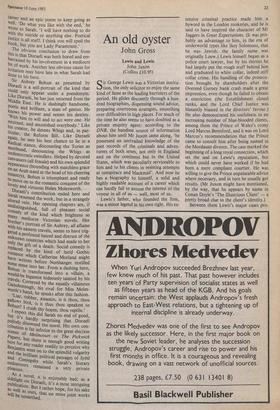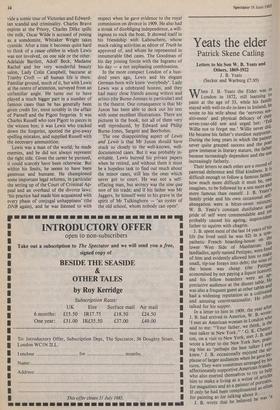An old oyster John Gross
Lewis and Lewis John Juxon (Collins £10.95)
C ir George Lewis was a Victorian institu- k, don, the only solicitor to enjoy the same kind of fame as the leading barristers of the period. He glides discreetly through a hun- dred biographies, dispensing sound advice, preparing courtroom strategies, smoothing over difficulties in high places. For much of the time he also seems to have doubled as a private enquiry agent: according to the DNB, the handiest source of information about him until Mr Juxon came along, 'he possessed an unrivalled knowledge of the past records of the criminals and adven- turers of both sexes, not only in England and on the continent but in the United States, which was peculiarly serviceable to him and to his clients in resisting attempts at conspiracy and blackmail'. And now he has a biography to himself, a solid and highly readable account of a career which can hardly fail to arouse the interest of the voyeur in all of us — well, most of us. Lewis's father, who founded the firm, was a minor legend in his own right. His ex- tensive criminal practice made him a byword in the London rookeries, and he is said to have inspired the character of Mr Jaggers in Great Expectations. (It was pro- bably an advantage to him, in the era of underworld types like 'key Solomons, that he was Jewish: the family name was originally Loew.) Lewis himself began as a police court lawyer, but by his thirties he had largely put the rough stuff behind him and graduated to white collar, indeed stiff collar crime. His handling of the prosecu- tion brought by shareholders after the Overend Gurney bank crash made a great impression, even though he failed to obtain a conviction (the Establishment closed ranks, and the Lord Chief Justice was blatantly biassed in the directors' favour.) He also demonstrated his usefulness to an increasing number of blue-blooded clients, among them the Prince of Wales's crony Lord Marcus Beresford, and it was on Lord Marcus's recommendation that the Prince came to consult him after being named in the Mordaunt divorce. The case marked the beginning of a long royal connection, which set the seal on Lewis's reputation, but which could never have worked if he had been a mere compliant courtier. He was willing to give the Prince unpalatable advice where necessary, and in turn he usually got results. (Mr Juxon might have mentioned, by the way, that he appears by name in Conan Doyle's 'The Illustrious Client' — a pretty broad clue to the client's identity.)
Between them Lewis's major cases pro-
vide a scenic tour of Victorian and Edward- ian scandal and criminality. Charles Bravo expires at the Priory, Charles Dilke spills the milk, Oscar Wilde is accused of posing as a somdomite, Whitaker Wright takes cyanide. After a time it becomes quite hard to think of a cause celebre in which Lewis was not involved, on one side or the other. Adelaide Bartlett, Adolf Beck, Madame Rachel and her very wonderful beauty salon, Lady Colin Campbell, baccarat at Tranby Croft — all human life is there. Familiar ground, much of it, but with Lewis at the centre of attention, surveyed from an unfamiliar angle. He turns out to have played a much bigger part in a number of famous cases than he has generally been given credit for, most notably in the affair of Parnell and the Pigott forgeries. It was Charles Russell who tore Pigott to pieces in the witness box; it was Lewis who tracked down the forgeries, spotted the give-away spelling mistakes, and supplied Russell with the necessary ammunition.
Lewis was a man of the world; he made enemies, and he did not always represent the right side. Given the career he pursued, it could scarcely have been otherwise. But within his limits, he seems to have been generous and humane. He championed some important legal reforms, in particular the setting up of the Court of Criminal Ap- peal and an overhaul of the divorce laws: `his practice had made him acquainted with every phase of conjugal unhappiness' (the DNB again), and he was listened to with respect when he gave evidence to the royal commission on divorce in 1909. He also had a streak of disobliging independence, a will- ingness to rock the boat. It showed itself in his friendship with Labouchere, whose muck-raking activities as editor of Truth he approved of, and whom he represented in innumerable libel cases. The Goodman of his day joining forces with the Ingrams of his day — a not unpleasing combination.
In the more compact London of a hun- dred years ago, Lewis and his elegant German-born wife knew 'everybody'. Lady Lewis was a celebrated hostess, and they had many close friends among writers and artists (the Burne-Joneses in particular) and in the theatre. One consequence is that Mr Juxon has been able to deck out his text with some excellent illustrations. There are pictures in the book, not all of them very well reproduced, by Edward and Philip Burne-Jones, Sargent and Beerbohm.
The one disappointing aspect of Lewis and Lewis is that Mr Juxon should have stuck so closely to the well-known, well- documented cases. But it was probably in- evitable. Lewis burned his private papers when he retired, and without them it must be a hopeless task to find out much about the minor cases, still less the ones which never got to court. He was not a self- effacing man, but secrecy was the sine qua non of his trade; and if his father was Mr Jaggers, he himself went to his grave in the spirit of Mr Tulkinghorn — 'an oyster of the old school, whom nobody can open'.







































 Previous page
Previous page